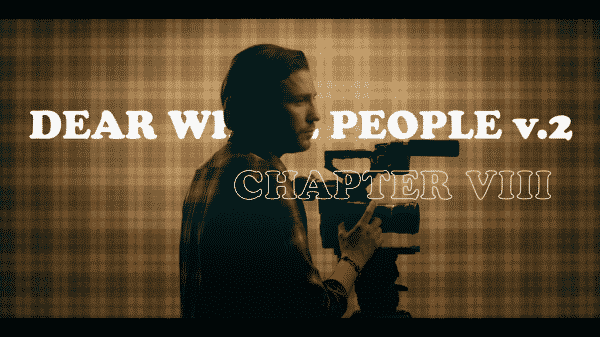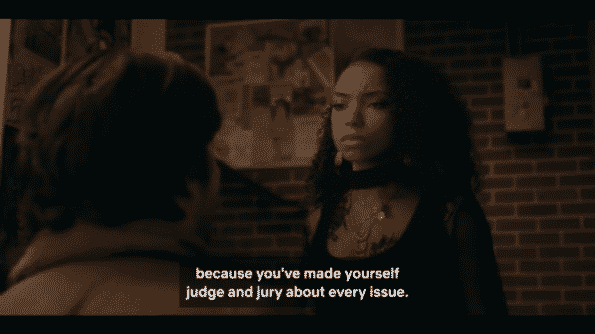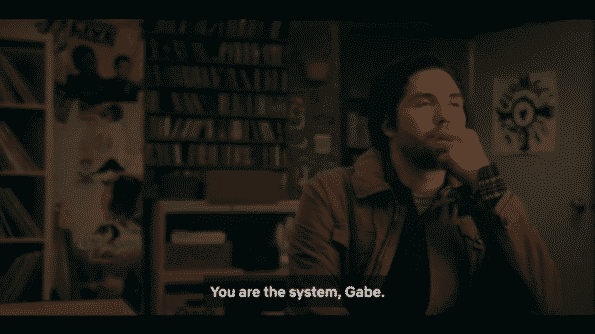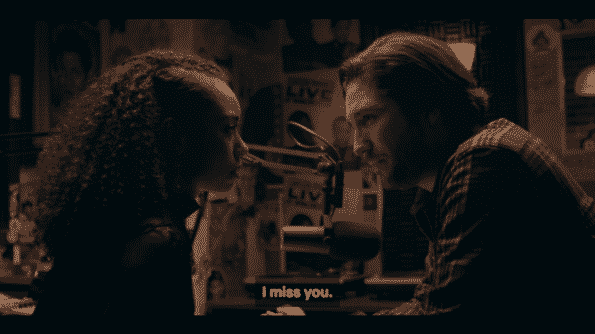Dear White People: Season 2/ Episode 8 “Chapter VIII” – Recap/ Review (with Spoilers)
Gabe and Sam have a real conversation. One that fully addresses Sam, narcissism and all, as well as Gabe and how white allies, or those who attempt to be, will forever be dealing with the learning process. Network Netflix Director(s) Justin Simien Writer(s) Jack Moore Air Date 5/4/2018 The Read of Samantha White: Sam, Gabe…

Spoiler Alert: This summary and review contains spoilers.
Additionally, some images and text may include affiliate links, meaning we may earn a commission or receive products if you make a purchase.
Gabe and Sam have a real conversation. One that fully addresses Sam, narcissism and all, as well as Gabe and how white allies, or those who attempt to be, will forever be dealing with the learning process.
| Network | |
| Netflix | |
| Director(s) | Justin Simien |
| Writer(s) | Jack Moore |
| Air Date | 5/4/2018 |
The Read of Samantha White: Sam, Gabe
As part of his documentary, naturally, Sam has to be a figure since she has made herself a prominent member of the Black voice at Winchester. Problem is, as was always an issue with Sam, the ability to get a real conversation going is difficult. Especially since Sam wants to be petty, a bit immature, and antagonistic. All because she is under the belief Gabe is trying to get her, on camera, to say something which can be used against her.
Leading to Gabe, who is accused of trying to capitalize off of a situation he helped create, basically reading Sam. He breaks down her part in the racial unrest and, of course, because Sam came ready for battle, more than a conversation, she has a response for everything. There is no listening to what Gabe is saying, at least at first, just redirection. Gabe asks if Sam feels responsible for Silvio becoming a popular figure now and this leads to her saying he is trying to victim blame. And there comes a point when you realize that Sam is very good, as Gabe says, at being judge and jury but doesn’t take well to being wrong and, in conversation, reflecting on the possibility.
Commentary

Sam has floated in the background for most of the season, thus allowing everyone else to shine, and I appreciate that. Then, for many who may not like Sam, perhaps how she approaches things, Gabe confronts her on a lot of the issues I’m sure people have with the character. I’m talking serious reads that had me flailing and biting a finger for while they were personal because it is Sam’s life and politics, they were not personal in the pursuit of hurting her.
If anything, and as seen with how she interacts with Joelle, among others, it kind of was a wakeup call. For, in many ways, Sam preaches to the choir and admits to trying to incite those not in the congregation to listen. Not to start a dialog but to react. To, get a rise so maybe they won’t be so indifferent. Making Gabe’s Batman comment make a lot of sense. For while crime always existed, as racism always did, always will, in Sam fighting it loud, and flashy, she inspired others to fight back loud and flashy.
Yet, there comes a point in the back and forth where, after Gabe has gone in on Sam enough, to the point she is ready to leave, you realize Sam is just trying to get some sort of power over the situation she was given. She is a Black woman on a predominately white campus not filled with everyday regular people. These are people with privilege, who will likely become CEOs, people high up in government, and this may be the last time in her life she has the opportunity to speak with these people. Maybe plant some seed so that once they leave or graduate Winchester, they won’t keep the system running but dismantle it.
A responsibility that is taxing and requires you to put your guard up because, as shown by the autopsy of Martin Luther King Jr., one of two things will happen. Either they will kill you with a bullet or kill you with the stress. So, in the age of the internet, where you have the ability to be anonymous, you got to figure out a way to survive. Even if that includes pushing people away who you care and love but can’t make things better.
The Dismantling of Gabe: Sam, Gabe
Leading to Sam’s rebuttal. All of which deals with not just criticizing Gabe, but white saviors and allies in general. Her means of expression are under attack just because they aren’t produced like a kindergarten teacher. She is analyzed, threatened, and her personal life is used to craft torture. Take note, nowhere in Sam’s show does she threaten lives and yet hers gets threatened by an e-card and sent to her parents. A “Sorry for your lost” because your daughter is a racist n****r.
And Gabe, who was acting slightly high and mighty, dares to question if what Sam does is a movement or a primal scream. Her response is both because, otherwise, how can she continue? Especially when people like Gabe, who come about seeming to mean well, don’t necessarily contribute where and when needed?
Commentary

Let’s just give applause to Logan Browning in all this. Yes, John Patrick Amedori took her to task, but fielding all the criticism and then bringing as poignant criticism back, it was hard to not get riled up for both sides. For, in my mind, the battle between Gabe and Sam is one that currently exists. The fight between those who question why progress is so slow, what will it take to no longer have to deal with this system which some won’t admit exists and then the allies. Those who, because of their privilege, are able to come into the yard and cookouts of the oppressed, but only can go so far as the steps and look inside. They can never truly live what is going on and, as many may have witnessed in middle or high school, look at those who are militant as Sam as the Malcolm X types who don’t want reconciliation.
But, here is the thing, taking note of Trevor Noah’s book, [tooltips keyword= ’Born a Crime’ content = ‘Trevor Noah, of The Daily Show chronicles his life growing up as a South African within the final stretch of the apartheid era and being born as something which shouldn’t legally happen – Recap/Review.‘], and what Sam says, reconciliation isn’t something that can happen yet because many steps to get there are being skipped. Such as a full-blown acknowledge that, to the point of changing DNA, this country has deeply scarred multiple ethnic groups to the point it’ll take generations to really recover. Something that either is ignored, rewritten to not be as bad or many people’s favorite, “Well, my family never owned slaves” or something to that tune.
Thus presenting a dismissive and often times antagonizing tone. For the point isn’t what your family didn’t do or have, but what you are doing with what you have – which is privilege. Some of which many think they don’t have because they are poor, gay, not cis, or a woman, and so they feel there is an exception. They might be white but they are not part of the problem.
However, what this season has been building to is this episode. It addresses how documentaries inherently are bias. This episode addresses that you cannot be neutral on a moving train or abstain. As the old saying goes, you are either part of the problem or the solution and saying, “It isn’t my fault, why am I being blamed for this” means you don’t want to do anything about it. That you are so comfortable with how things are you are fine with a world for which many find insufferable.
But the kicker with Gabe coming for Sam is what started out as critiques, I honestly thought were rather good, began to overstep and make you understand Sam’s clap backs weren’t her being defensive. They weren’t her just focusing on how to reply. Seeking out keywords. This was an old conversation she has already had but because it was Gabe, and because he tries to be a good guy, or at least seem like one, she’ll reiterate a few old ditties one more time. Because clearly, why he may feel guilty about what he knows to be true, there is this need to offload some of the weight of this guilt for it is inconveniencing him a bit.
The Possibility of Reconciliation: Sam, Gabe, Joelle
One of the underlying reasons this gets so passionate is because of Gabe and Sam’s unresolved personal issues. Gabe dumped Sam, after her long struggle to say she loved him, when she needed him most, and Sam cheated on Gabe with Reggie. I’ve been saying lately, “You don’t really argue with anyone you don’t eventually want to reconcile with” and this is a prime example. They go hard and push each other to the brink of crying because the hurt in their heart they want to avoid so they rather speak on everything but that.
However, after a certain point, when both seem too exhausted to hurl rocks at one another anymore, they get to the heart of things. There are apologies, confessions of missing one another, and it seems, despite what was said and what happened, a romantic reconciliation. That is, until Joelle comes in and reveals Sam’s worse fear. Likely something has happened to her father and there is a need to go home. For be it death, being hospitalized, or what have you, something serious has happened.
Commentary

So much was said and left to process over the course of 30 minutes that it is hard to not be exhausted. That is, especially if you are really listening and going beyond the quips and taking note of how one character, or the other, got read. Because, in a way, the passionate conversation between two sides is what is missing. Bringing up Born a Crime again, the lack of having a real and tough conversation, not just a one-way dialog, is what makes the system run. One side yells about the machine and the other makes sure it keeps running. It’s a cycle which keeps the country running with neither side, no matter the similarities or differences, seemingly willing to just sit down, take some responsibility, and really figure out how the two cannot necessarily move on, but at the very least do better.
Question(s) Left Unanswered
- How bad with this Carlson and Rikki situation be if this is how Gabe and Sam go at one another?
Collected Quote(s) & .Gifs
The truth is often elusive.
[the] system [is] not some distant, separate thing. It is literally regular people making decisions. Some decide to enable it and others don’t.
It’s easier to fight an enemy you can see.
Is this a movement or a primal scream?
Highlights
- Logan Browning, with the assist from John Patrick Amedori because her scenes with him have made it so she has to be seen as an actress. Not someone who can simply remember lines, and is like a model in an extended commercial. She is someone who can make you feel emotions. Be it smugly satisfied she is being told off, saddened by how far someone will take having a difference of opinion, and maybe even crying with her as you think to yourself, she is going through way more than she can probably handle. Because, at 20, can you really say she has everything required to deal with a whole university’s mess? Much less personal attacks dealing with her being bi-racial to death threats and more?
- An equal conversation which criticizes both sides in a way which doesn’t hold punches but addresses real issues.
- Coco’s point about why she wouldn’t want to see Michelle Obama and Kamala Harris run together on a presidential ticket.
- Kelsey addressing her feeling like, as much content that there is out there, she still can’t find someone in media like herself. That is a Trini queer woman.
Follow Wherever I Look on Twitter or Like us on Facebook.
Previous Episode’s Recap
[visual-link-preview encoded=”eyJ0eXBlIjoiaW50ZXJuYWwiLCJwb3N0IjoyMDU4NiwicG9zdF9sYWJlbCI6IlBvc3QgMjA1ODYgLSBEZWFyIFdoaXRlIFBlb3BsZTogU2Vhc29uIDIvIEVwaXNvZGUgNyBcIkNoYXB0ZXIgVklJXCIgLSBSZWNhcC8gUmV2aWV3ICh3aXRoIFNwb2lsZXJzKSIsInVybCI6IiIsImltYWdlX2lkIjoyMDU4OCwiaW1hZ2VfdXJsIjoiaHR0cHM6Ly93aGVyZXZlci1pLWxvb2suY29tL3dwLWNvbnRlbnQvdXBsb2Fkcy8yMDE4LzA1L0RlYXItV2hpdGUtUGVvcGxlLVNlYXNvbi0yLUVwaXNvZGUtNy1DaGFwdGVyLVZJSS1UaXRsZS1DYXJkLnBuZyIsInRpdGxlIjoiRGVhciBXaGl0ZSBQZW9wbGU6IFNlYXNvbiAyLyBFcGlzb2RlIDcgXCJDaGFwdGVyIFZJSVwiIC0gUmVjYXAvIFJldmlldyAod2l0aCBTcG9pbGVycykiLCJzdW1tYXJ5IjoiU3RyaXBwZWQgb2YgdGhlIHF1YWxpdGllcyBoZSB0b29rIHVwb24gZm9yIHN0YXR1cywgVHJveSBpcyBsZWZ0IHRyeWluZyB0byBmaW5kIHdobyBoZSBpcyBpbiBzcGl0ZSwgYW5kIGJlY2F1c2UsIG9mIGhpcyBjb21tdW5pdHkgYW5kIHVwYnJpbmdpbmcuIiwidGVtcGxhdGUiOiJkZWZhdWx0In0=”]


